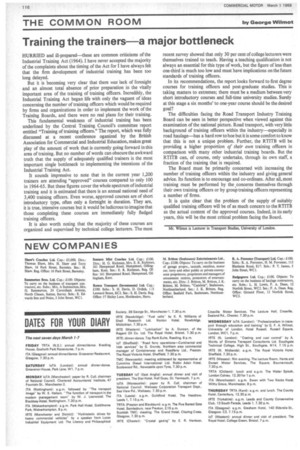Training the trainers a major bottleneck
Page 118

If you've noticed an error in this article please click here to report it so we can fix it.
HURRIED and ill-prepared-these are common criticisms of the Industrial Training Act (1964). I have never accepted the majority of the complaints about the timing of the Act for I have always felt that the firm development of industrial training has been too long delayed.
But it is becoming very clear that there was lack of foresight and an almost total absence of prior preparation in the vitally important area of the training of training officers. Incredibly, the Industrial Training Act began life with only the vaguest of ideas concerning the number of training officers which would be required by firms and organizations in order to implement the work of the Trainibg Boards, and there were no real plans for their training.
This fundamental weakness of industrial training has been underlined by the Central Training Council's committee report entitled "Training of training officers." The report, which was fully discussed at a recent conference oganized by the British Association for Commercial and Industrial Education, makes great play of the amount of work that is currently going forward in this area of training. But no number of words can obscure the awkward truth that the supply of adequately qualified trainers is the most important single bottleneck to implementing the intentions of the Industrial Training Act.
It sounds impressive to note that in the current year 1,200 trainers are attending "approved" courses compared to only 100 in 1964-65. But these figures cover the whole spectrum of industrial training and it is estimated that there is an annual national need of 3,400 training officers. Even worse, approved courses are of short introductory type, often only a fortnight in duration. They are, it is true, intensive courses but it would be ludicrous to imagine that those completing these courses are immediately fully fledged training officers.
It is also worth noting that the majority of these courses are organized and supervised by technical college lecturers. The most recent survey showed that only 30 per cent of college lecturers were themselves trained to teach. Having a teaching qualification is not always an essential for this type of work, but the figure of less than one-third is much too low and must have implications on the future standards of training officers.
In its recommendations, the report looks forward to first degree courses for training officers and post-graduate studies. This is taking matters to extremes; there must be a medium between very short introductory courses and full-time university studies. Surely at this stage a six months' to one-year course should be the desired goal?
The difficulties facing the Road Transport Industry Training Board can be seen in better perspective when viewed against this examination of the national picture. Road transport, with very little background of training officers within the industry-especially in road haulage-has a hard row to hoe but it is some comfort to know that this is not a unique problem. Further, the RTITB will be providing a higher proportion of their own training officers in comparison with many other industrial training boards. But the RTITB can, of course, only undertake, through its own staff. a fraction of the training that is required.
The Board must be primarily concerned with increasing the number of training officers within the industry and giving general advice. Its function is to encourage and co-ordinate. After all, most training must be performed by the _concerns themselves through their own training officers or by group training officers representing a number of firms.
It is quite clear that the problem of the supply of suitably qualified training officers will be of as much concern to the RTITB as the actual content of the approved courses. Indeed, in its early years, this will be the most critical problem facing the Board.








































































































































































